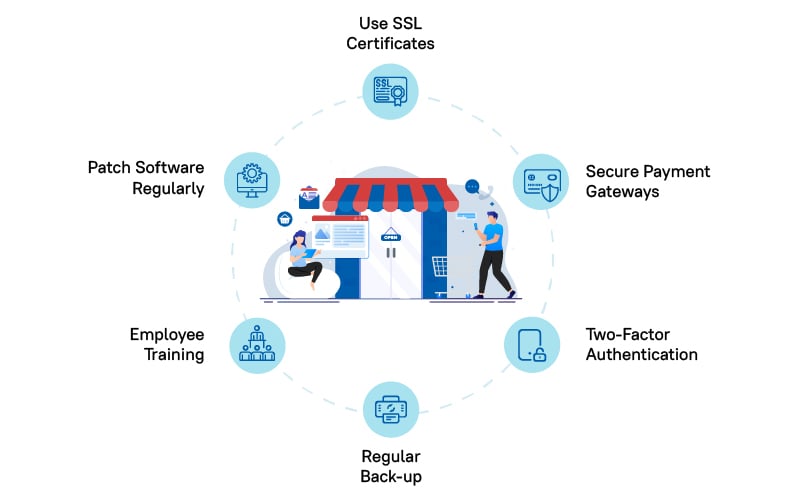In today’s digital age, eCommerce has become a booming industry. Given the rise of online shopping, eCommerce security has become more critical than ever. Retailers must always ensure that their customers’ personal and financial information is secure to avoid breaches and data theft.
This blog will explore the many types of cybercrimes that can affect eCommerce businesses, the steps businesses take to protect themselves against these crimes, and the overall importance of eCommerce website security.
Types of Cybercrimes
- Phishing Scams: Phishing scams are the most frequent cybercrimes that affect eCommerce businesses. They involve sending emails that look legitimate but contain malicious links that are used to steal customer data.
- Malware and Ransomware: Malware and ransomware attacks are other common cybercrimes that eCommerce businesses must protect themselves against. These attacks involve infecting the eCommerce website with malicious software that can steal, encrypt, or delete customer data, damage the website, or even demand a ransom payment.
- DDoS (Distributed Denial of Service) attacks: DDoS attacks involve flooding the eCommerce website by spamming with internet traffic to make it crash. These attacks often disrupt the eCommerce website’s operations or steal customer data and are launched from several connected electronic devices “distributed” online.
- SQL Injection Attacks: SQL injection attacks exploit vulnerabilities in the eCommerce website’s database to steal customer data. These attacks can be devastating and result in the theft of sensitive information, such as credit card numbers, and personal information, such as names, addresses, and phone numbers.
- Man-in-the-Middle (MITM) Attacks: MITM attacks involve intercepting communication between the eCommerce website and the customer to steal data. These attacks can be hard to detect and can result in the theft of sensitive data.
- Brute Force Attacks: Brute force attacks involve using automated software like BruteX, Callow, and SSB to try to guess the password for an eCommerce website. These automated tools either run all combinations of characters, decrypt encrypted passwords, or find weak passwords to commit Brute Force Attacks. These attacks can be used to gain unauthorized access to the website and steal customer data.
Essential Steps for Your Protection

- Use SSL Certificates: SSL certificates provide secure communication between the eCommerce website and its customers by encrypting sensitive data, such as credit card numbers, and personal information, such as phone numbers.
- Choose Secure Payment Gateways: Retailers should always choose PCI-compliant payment gateways such as Stripe and provide end-to-end encryption to protect their customers’ financial information.
- Implement Two-Factor Authentication: Two-factor authentication is an additional layer of security that requires customers to enter a second password for authentication, such as a code sent to their mobile phone or an email, to access their account.
- Update/Patch Software Regularly: Retailers should regularly update their eCommerce platforms and software to ensure they are protected from security vulnerabilities. They should also apply security patches as soon as they become available to prevent hackers from exploiting security flaws.
- Provide Employee Training: Retailers should train their employees on eCommerce security best practices, such as proper password management, recognizing phishing scams, and data protection.
- Back up Customer Data Regularly: Retailers should regularly back up their website and customer data to ensure they can recover quickly in case of a security breach or data loss.
Conclusion:
eCommerce security is a critical concern for retailers. Cybercrimes can often compromise customer data, damage a business’s reputation, and result in hefty fines and lawsuits.
By following best practices such as SSL certificates, secure payment gateways, two-factor authentication, regular updates and patches, employee training, and backups, retailers can protect their customers’ personal and financial information and thereby avoid breaches and data theft.
It is essential to prioritize eCommerce security to build customer trust, loyalty, and compliance with data protection regulations. In essence, eCommerce security is necessary to protect customers’ personal and financial data and for the sustainability of a retail business.
What Next?
- Analytix Solutions offers complete eCommerce website development services, from initial concept to launch, ensuring the full cyber security of your eCommerce store. Contact us to know more.
- Email us at sales@analytix.com or call us at 781.503.9003 today.
- Follow our blog for industry trends and the latest updates.
- Engage with us on LinkedIn and Twitter.
